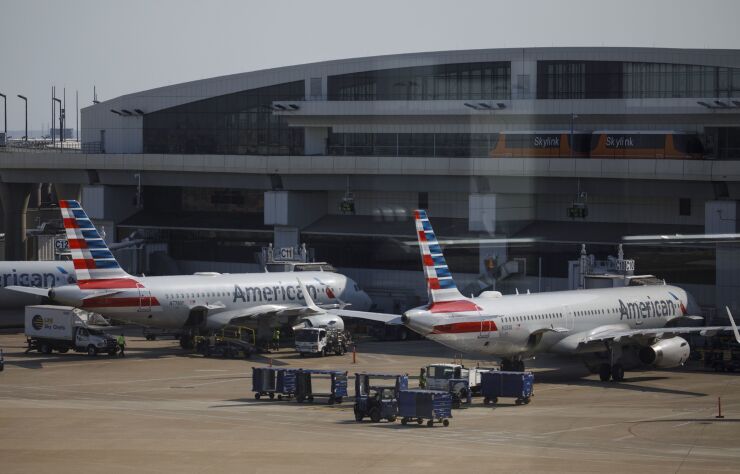On the wings of passenger traffic that has nearly returned to pre-pandemic levels and a rating upgrade, the Dallas Fort Worth International Airport will bring its first new money issue since 2017 to the municipal bond market next week.
The $1.188 billion of taxable joint revenue improvement bonds are slated to price April 5 and 6 with Citigroup at the helm in its biggest deal since a Texas firearms discrimination law took effect in September. Ahead of the sale, the airport won back its A-plus rating from S&P Global Ratings, which had lowered DFW a notch to A in 2020 as the fallout from the COVID-19 pandemic led to downgrades for dozens of U.S. airports.
"The upgrade reflects our view of DFW's demonstrated financial resilience and rate-setting flexibility during a period of materially depressed activity, along with strong passenger recovery trends," S&P analyst Ken Biddison said in a statement.

For the first four months of the airport’s current fiscal year, which began Oct. 1, the number of passengers reached 92% of the total during the same pre-COVID-19-pandemic period in fiscal 2020, and non-airline revenue reached 99%, according to an investor roadshow for the bond sale.
“We’re running close to pre-pandemic levels from a standpoint of passengers and from a revenue standpoint we’re back to pre-pandemic levels,” said Chris Poinsatte, the airport’s chief financial officer.
With cases of the virus waning and people willing to travel again, the airport sector has bounced back from drastic drops in passenger volume and revenue in the wake of the pandemic.
S&P downgraded 75 airport ratings in 2020 and upgraded 14 in 2021 and six so far in 2022, including DFW. Both S&P and Moody’s Investors Service have positive outlooks for the U.S. airport sector this year.
Jeff Lipton, head of municipal credit and market strategy at Oppenheimer & Co., said he is bullish on the sector, noting it will be one of the biggest beneficiaries of the economic reopening.
“Generally speaking, the airport sector has demonstrated resiliency,” he said. “We like the airport sector and general aviation revenue bonds are certainly appropriate for quality oriented portfolios, both retail and institutional. “
As for DFW, Dan Solender, director of tax free fixed income at Lord Abbett, said the airport is well positioned with a range of hub and origination and destination traffic.
“They do have a good amount of debt from all the improvements they have done, but they are very busy and have a lot of demand from the airlines,” he said.
The taxable bonds in DFW’s upcoming sale are in keeping with the airport’s policy to no longer issue debt subject to the Alternative Minimum Tax and to attract a broader base of investors, including
“We’ve got our underwriters actively engaged in looking at international (investors), that’s for sure,” he said, noting that past bond sales had overseas buyers.
James Mauldin, DFW’s vice president of treasury management, said term bonds on the long end of the curve are being considered along with a mix of make-whole and par calls.
Poinsatte said make-whole calls are favored by some European investors, while 10-year par calls are popular with buyers in Taiwan.

The airport is also contemplating interest only payments on the bonds until 2046 or 2047, when principal payments would start. Poinsatte said the airport is trying to match debt service payments to the 30-year life of the facility improvements.
“Looking at our overall debt profile, that’s what makes sense right now,” he said. “We’ve got quite a bit of room out on the long end of the curve.”
Proceeds from the bonds will help fund the airport’s capital program for terminal and other infrastructure improvements, which is projected to cost $5.9 billion from fiscal 2022 to fiscal 2027.
About 75% of the cost is expected to be raised through debt financings with the remainder coming from $806 million in grants and $658 million of cash. Those assumptions are based on DWF’s current airline use agreement, which has been operating on a month-to month basis since Oct. 1.
Given the size of the capital program, Poinsatte said a new agreement could take another nine to 12 months to complete.
“Our goal as part of that negotiation is to create more positive cash flow to the airport given the fact we have to issue more debt and it’s our goal to have improving debt service coverage ratios when we get done with the negotiation,” he said.
The bonds, which are backed by the airport’s airline and non-airline revenue, were also rated A-plus by Fitch Ratings, A1 by Moody’s and AA by Kroll Bond Rating Agency.
Rating agencies cited the size of the capital program and the dominance of American Airlines, which accounted for about 88% of the airport’s enplaned passengers in fiscal 2021, as credit factors.
“The ratings negatively consider high leverage and high exposure to American, Moody's lowest rating of the four largest US based airlines,” Moody’s said in a statement. Moody's rates American B2. “Leverage will increase as the airport implements its $5.9 billion capital plan through fiscal 2027, however rapid amortization of previously issued debt will limit the net debt increase to around $3 billion.”
The choice of Citigroup to lead underwriters in the deal comes as the bank’s participation in Texas bond issues has been questioned by a firearm industry trade group in the wake of a
In a letter to the Texas attorney general, the National Shooting Sports Foundation objected to Citigroup’s winning bid last fall for a
In 2018, the bank announced a policy that requires new retail sector clients to adhere to “best practices” of prohibiting firearm sales to someone who has not passed a background check or is under age 21, and not selling bump stocks or high-capacity magazines.
Poinsatte said the airport was comfortable including Citigroup in the deal.
“The law is very clear what they have to attest to and they have attested to that and sent it to the attorney general and there has been no negative response from the attorney general on that,” he said.
The deal’s co-senior manager is Raymond James and co-managers are Academy Securities, Cabrera Capital Markets, Piper Sandler, Rice Financial Products, and Wells Fargo Securities.

McCall, Parkhurst & Horton and West & Associates are bond counsel; Bracewell and Hardwick Law Firm are disclosure counsel; Kelly Hart & Hallman and Escamilla & Poneck are underwriters counsel; and Hilltop Securities and Estrada Hinojosa & Company are financial advisors.
The airport, which received $611 million in pandemic-related federal aid and expects at least $320 million in entitlement funding under the new infrastructure act, has been using commercial paper as an interim tool to finance projects. Refundings of about $485 million of tax-exempt bonds and $100 million of commercial paper, as well as a taxable advance refunding of about $250 million of AMT bonds are anticipated for 2022, according to an online investor presentation about the deal.





